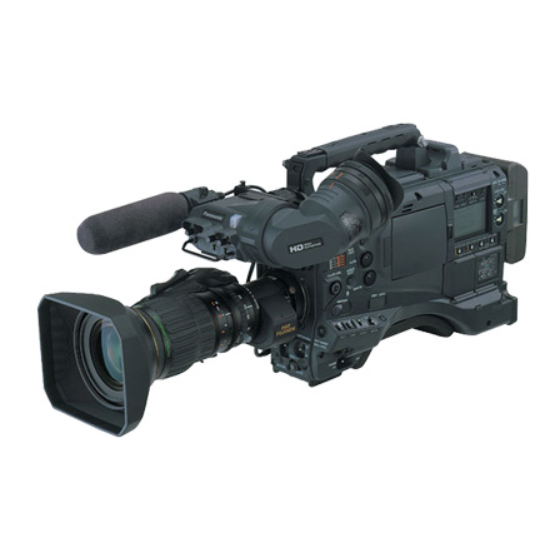Panasonic AJ-HPX3000 Brochure & specificaties - Pagina 5
Blader online of download pdf Brochure & specificaties voor {categorie_naam} Panasonic AJ-HPX3000. Panasonic AJ-HPX3000 16 pagina's. Driver software (firmware) update
Ook voor Panasonic AJ-HPX3000: Informatie menu (40 pagina's), Procedure (5 pagina's)

DSP (Digital Signal Processor)
New 2.2-megapixel Progressive/Interlace CCD
For the AJ-HPX3000, Panasonic developed a high-density 2.2-megapixel
2/3-inch CCD that provides high-resolution full-pixel (1920 x 1080) HD
images. The AJ-HPX3000 provides a choice of progressive / interlace HD
video formats; supporting native 1080 23.98p / 25p/29.97p, as well as
1080 50i and 1080 59.94i. The camera offers a high F10 sensitivity at
2000 lux when operating in 1080i.
Chromatic Aberration Compensation (CAC)
This exclusive technology works between lens and camera, allowing for a
highly sophisticated algorithm to be deployed that automatically
compensates the registration error that is caused mainly by lens
chromatic aberration, and minimizes the neighboring blur. By using a
CAC-compatible zoom lens, the AJ-HPX3000 can obtain images similar
to those captured with a prime lens.
DRS (Dynamic Range Stretcher) Function
DRS recognizes the average brightness of highlight and shadow areas
and then automatically adjusts the aperture and uses knee control to
suppress blocking in the shadow areas. In scenes with mixed dark and
light areas, such as when moving from indoors to outdoors, DRS
automatically provides a wider dynamic range with minimal blown
highlights and blocked shadows.
High-Sensitivity Digital Super Gain
The high-sensitivity F10 aperture and digital super gain (frame cumulative
mode) let the AJ-HPX3000 record with a high S/N ratio*
noise that commonly comes with higher gain. The gain and digital super
gain can be flexibly combined to achieve highly sensitive recording of up
to a +56 dB*
2
gain increase and 0.064 lx minimum illumination, to suit
different shooting conditions.
*1: Due to the use of image accumulation, the number of recorded frames per second
decreases. This results in a frame-by-frame playback effect.
*2: With super gain set at +36 dB and digital super gain (6P cumulative mode) at +20 dB.
Scan Reverse Function for Film Lens Use
The AJ-HPX3000 can use an ultra prime lens and even an anamorphic
lens adapter that creates a 2.35:1 aspect image for wide-screen
cinematic shooting without cropping the image. Its scan reverse function
cancels the image inversion that occurs when Angenieux's HD lens
adaptor is used.
Simulation Showing the CAC (Chromatic Aberration Compensation) Effect
Full screen image (simulated*)
When a zoom lens is used, chromatic aberration occurs near the perimeter of the R,
G and B channels (with CAC turned off). When the advanced CAC function is
utilized, after the CCD captures the image, the CAC function uses the DSP circuit to
perform digital compensation using a table prepared for selected lens**.
The beneficial effect is more prominent for higher-resolution images".
** FUJINON 2/3" LENS compatible with CAC HA22x7.8BERM-M58/HA22x7.8BERD-S58/
HA16x6.3BERM-M58/HA16x6.3BERD-S58
CANON 2/3" LENS compatible with CAC HJ22ex7.6B IASE/HJ17ex7.6B IASE
The DSP performs 14-bit A/D
conversion for the RGB signal input
from the CCD, and completes all image
processes, such as CAC, DRS, gamma,
12-axis independent color
compensation and detail,
simultaneously and digitally to achieve
high image quality without degradation.
1
and less of the
CAC OFF (simulated*)
CAC ON (simulated*)
Gamma curve
FILMLIKE1
FILM-REC
SD
FILMLIKE3
FILMLIKE2
HD
Luminance
HD:
Normal setting for HDTV
SD:
Normal setting for SDTV
FILMLIKE 1 — 3:
Film-like video production (3 modes of gradation)
FILM REC:
Movie production
Six Gamma Modes Including VariCam Film-Rec
A new digital signal processing (DSP) circuit in the AJ-HPX3000 has six
selectable gamma modes. These include F-Rec gamma for movie
production, which is the same high-end function incorporated in the
Varicam. Select the mode (see the diagram above) to match the
application.
14-Bit Digital Processing
with 12-Axis Color Correction
In the AJ-HPX3000, we offer a 14-bit A/D conversion system along with
the new high-performance DSP circuit. The 12-axis color correction
matrix lets you make fine adjustments in specific color regions. Functions
such as skin detail let you further fine-tune the image.
Scene Files and Lens Files
• Scene Files: Store specific camera settings in built-in memory. Four
files with settings can be stored in the camera's memory. Files can also
be copied onto an SD/SDHC Memory Card, allowing storage of up to
eight files.
• Lens Files: Store settings for interchangeable lenses. Eight files can be
stored in the camera unit, and 64 (8 x 8) files can be saved on an
SD/SDHC Memory Card.
Shooting Assist Functions
• Three User Buttons: Assign a function to each, and then you can
select functions with pushbutton ease.
• Focus Assist: Facilitates focusing by displaying the frequency.
• Variable Color Temperature: Color temperature can be adjusted with
the jog dial after the white balance is set.
• Electronic Shutter with Half-Speed: The AJ-HPX3000 has a full
collection of shutter angle options like the VariCam. It also includes Six
fixed speeds of up to 1/2000sec, plus "half-speed" (180-degree) slow
and synchro-scan capability.
• Two optical filters, ND and CC, have four positions each. The 3200K,
4300K, 5600K and 6300K positions of the CC filter help to express
deeper colors.
• A 3-point locking viewfinder mount allows precise adjustment.
• The Audio Rec level adjustment features a push lock function.
• The Audio Input level adjustment (front) can be switched ON/OFF and
allocated to desired channels.
Simulation Showing the DRS (Dynamic Range Stretcher) Effect
DRS OFF*
As seen in the image at the left, the ordinary auto knee function results in blown
highlights outside the window or blocked shadows inside the room. The DRS
detects the average brightness of both light and dark areas, and prevents blown
highlights and blocked shadows to provide a broader dynamic range. This is
especially effective for film-like HD production.
* These simulated images ware prepared for the purpose of explaining the function. It
is not actual captured image. The effect is emphasized, and the actual image differs
from the simulated images shown here.
DRS ON*
4
